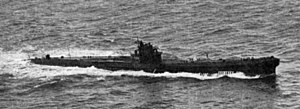USS Barracuda (SS-163)

| |
| Career | |
|---|---|
| Launched: | 17 July 1924 |
| Commissioned: | 1 October 1924 |
| Decommissioned: | 3 March 1945 |
| Fate: | sold North American Smelting 16 November 1945 and scrapped |
| Stricken: | 16 November 1945 |
| General characteristics | |
| Displacement : | •2000 tons (surfaced), 2620 tons (submerged) |
| Length: | 326 ft (99.4m) (waterline), 341ft 6in (104m) (overall) |
| Beam: | 27 ft 7 in (8.4 m) |
| Draft: | 15 ft 11 in (4.9 m) |
| Speed: | 18.7 knot (35 km/h) |
| Test depth: | 200 ft (182m) |
| Propulsion: | 4 Busch-Sulzer diesel engines, 2x 1200hp (895kW) Elliott electric motors (120 cell Exide battery) |
| Complement: | 80 officers and men |
| Armament: | 6 x 21 in (533 mm) torpedo tubes (4 bow, 2 stern; 12 torpedoes), 1 x 5 in (127 mm)/51cal gun, 2 machineguns |
USS Barracuda (SF-4/SS-163), lead ship of her class and first of the "V-boats," was the second ship of the United States Navy to be named for the barracuda (after USS F-2).
Construction
Her keel was laid down at Portsmouth Navy Yard. She was launched as V-1 on 17 July 1924, sponsored by Mrs. Cornelia Wolcott Snyder, wife of Captain Snyder, and commissioned on 1 October 1924 with Lieutenant Commander S. Picking in command.
V-1 had been commissioned for surface running only, to permit an early trial of her engines. She was assigned to Submarine Division 20 and, after cruising along the New England coast, sailed on 14 January 1925 on a surface cruise of the Caribbean Sea, returning in May 1925 for completion. V-1 cruised along the Atlantic coast and in the Caribbean until November 1927.
Operational life
On 8 November 1927 Squadron 20 left Portsmouth, New Hampshire, for San Diego, California, arriving 3 December. Between December 1927 and May 1932 V-1 served with the Squadron on routine operations with the fleet along the west coast, in the Hawaiian Islands, and in the Caribbean. Her name was changed to Barracuda 9 March 1931 (for the scrapped F-2) and her designation to SS-163, 1 July 1931. In May 1932 she went into Rotating Reserve with Submarine Division 15 at Mare Island Naval Shipyard. In January 1933 Barracuda was assigned to Submarine Division 12 and, until late in 1936, operated along the west coast and cruised to Pearl Harbor and the Panama Canal Zone with the fleet. On 28 October 1936 she left San Diego for the Caribbean where she took part in the Gravimetric Survey Expedition. On 8 January 1937 Barracuda sailed from St. Thomas, Virgin Islands, and arrived at Philadelphia, Pennsylvania, on 14 January, where she remained until placed out of commission 14 May 1937.
Recommissioning
Barracuda was recommissioned at Portsmouth, New Hampshire, on 5 September 1940 and assigned to Submarine Division 9. She sailed from Portsmouth 2 March 1941 to Bermuda, returned in June; and joined Submarine Division 71. She remained in the New England area until sailing from New London, Connecticut, on 17 November 1941 to join the Pacific Fleet. She attended to duty in the Pacific Patrol Area until 15 December 1941 when she rejoined the Atlantic Fleet. Between 15 December 1941 and 7 September 1942 Barracuda was attached to Submarine Division 31 and completed six war patrols in the Pacific Ocean, southwest of Panama, without enemy contacts.
Barracuda returned to Coco Solo, Canal Zone, on 7 September 1942 and, following voyage repairs, she proceeded to Philadelphia, Pennsylvania, for overhaul. Following overhaul she was based at New London until February 1945 with Submarine Divisions 13 and 31. She operated on training problems with destroyers, other submarines, and planes in Block Island Sound. Barracuda arrived at Philadelphia Navy Yard on 16 February 1945; was decommissioned 3 March 1945; and sold 16 November 1945.
See USS Barracuda for other ships of the same name.
References
![]() This article incorporates text from the public domain Dictionary of American Naval Fighting Ships.
This article incorporates text from the public domain Dictionary of American Naval Fighting Ships.
